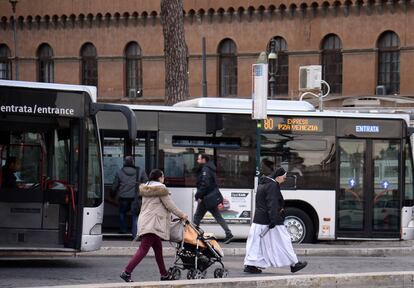Why free bus travel in Rome can end up being expensive
Debt-ridden Italian transportation company figures only one rider out of four pays for their ticket

When someone takes a bus in Rome, they enter an unknown dimension, the end of which is uncertain until they get off. Among other things, there is a 25% chance that the vehicle will break down. This could be the reason why just the same percentage of users (one in four) actually pays for their ticket, causing annual losses of €80 million. Welcome to ATAC (Agenzia del Trasporto Autoferrotranviario del Comune di Roma), the Sistine Chapel of disastrous management in the Italian capital.
The stories about this company, which is €1.3 billion in debt, are fascinating. Just recently, the company handed a report to the public prosecutor’s office and the Audit Court detailing the fraud it suffers on a daily basis. One of its drivers was also working as a mover, and another one had a side job in a funeral home. It also emerged that some employees worked just three hours a day and spent more time off work than actually working. One out of 10 did this every day, twice as many on weekends, and one was off for an entire year, as reported by the penultimate chief of ATAC, Bruno Rota.
A €70 million hole was discovered caused by the sale of false tickets at kiosks
Before current city mayor Virginia Raggi took office, this quasi-ministry had calmly stood by while “Parentopoli” ballooned. Parentopoli is a corruption case, which saw employees placing their relatives in ATAC jobs. A total of 40 people were subsequently fired and three managers convicted. The members of ATAC's 11 labor unions took 11,000 more hours than the ones allowed by the collective bargaining agreement, as Mattia Feltri explained in La Stampa.
But paying for a ticket does not guarantee that what you get is actually the real thing. In 2013, a €70 million hole was discovered in ATAC's accounts, caused by the sale of false tickets at kiosks. Clearly, everybody who has half a chance takes advantage of ATAC. Italy’s financial police denounced the double accounting by a group of employees who had been sending the profits to accounts in San Marino.
The service is rarely out of the news. This summer, a bus burst into flames at a bus stop in the north of Rome, and it sat there for 86 days. The subway as an alternative? Maybe, if there is no strike that day. And you wonder why Audrey Hepburn and Gregory Peck opted for the Vespa scooter?
An Elpais.cat project
Since November 2016, the Catalan edition of EL PAÍS, Elpais.cat, has been publishing a selection of news stories in English.
The texts are prepared by journalism students at the Pompeu Fabra University (UPF), who adapt content from EL PAÍS, adding extra information and explanation to these stories so that they can be understood in a global context.
This article was translated by Laura Lázaro and Marta Campabadal, and edited by the team at the EL PAÍS English Edition.
Tu suscripción se está usando en otro dispositivo
¿Quieres añadir otro usuario a tu suscripción?
Si continúas leyendo en este dispositivo, no se podrá leer en el otro.
FlechaTu suscripción se está usando en otro dispositivo y solo puedes acceder a EL PAÍS desde un dispositivo a la vez.
Si quieres compartir tu cuenta, cambia tu suscripción a la modalidad Premium, así podrás añadir otro usuario. Cada uno accederá con su propia cuenta de email, lo que os permitirá personalizar vuestra experiencia en EL PAÍS.
¿Tienes una suscripción de empresa? Accede aquí para contratar más cuentas.
En el caso de no saber quién está usando tu cuenta, te recomendamos cambiar tu contraseña aquí.
Si decides continuar compartiendo tu cuenta, este mensaje se mostrará en tu dispositivo y en el de la otra persona que está usando tu cuenta de forma indefinida, afectando a tu experiencia de lectura. Puedes consultar aquí los términos y condiciones de la suscripción digital.









































